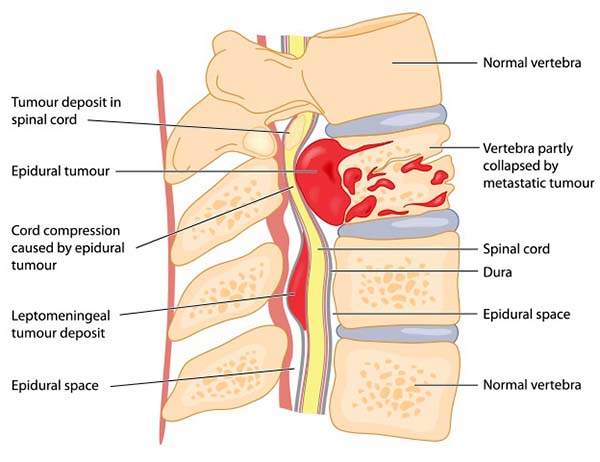
Spinal Tumours
A spinal tumour is rare and tends to occur following the growth of cells within the vertebrae and if they continue to grow they can then put pressure on the spinal cord or nerves in the spinal canal leading to pain if the vertebrae collapses as well as neurological dysfunction with regards to weakness, numbness, pins and needles in the limbs. Spinal tumours can be benign or malignant. Benign tumours tend to stay in the same vicinity but may grow. Malignant tumours either arise in the spine or may spread from other organs in the body. These are then named secondary deposits. The commonest sites of spread are from the breast, prostate, lung, thyroid and kidney.Primary tumours arising in the spine are more uncommon and the treatment of these would be slightly different to secondary deposits. All spinal tumours can be threatening to spinal cord function and therefore urgent assessment and treatment are necessary.
Common early symptoms would be that of aching or pain in the area where the tumour is located. It tends to be aggravated by movement and can refer into to the arm, chest or leg depending on which nerve is associated. Pain at night can be common and certainly a past history of a malignancy somewhere in the body is an important association. Some patients may experience progressive weakness in their legs and lose bladder/bowel function. Others may have little or no symptoms at all.
After a detailed history and examination, neurological assessment would be performed and questioning with regards to common associated organs also discussed. Additional test may include x-rays as well as whole spine MRI scan, CT chest/abdomen/pelvis, as well as a bone scan. Occasionally a biopsy of the tumour may be required to identify its origin.
Treatment depends on the clinical symptoms, examination and the origin of the spinal tumour. Some benign tumours may just need observation. Tumours that have come from other sites may require radiotherapy and/or chemotherapy and surgical intervention may be required if there is spinal instability causing pain and/or spinal cord compression amenable to surgery.
The objective of surgery is to reduce the tumour size and decompress the spinal cord and nerves and to stabilise the vertebrae involved. Occasionally minimally invasive techniques can be used to minimise blood loss, infection and enhance recovery time. Ongoing treatment would be in the hands of the local oncologist. The goal of surgery is to improve quality of life and to preserve neurological functioning. It also has an impact on pain if there is instability secondary to vertebral collapse. Unfortunately, it is not a curative procedure.
















